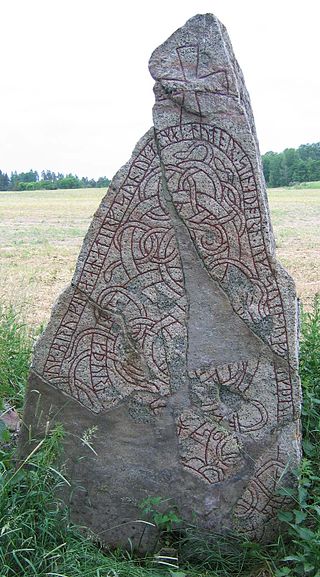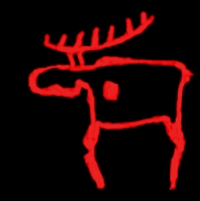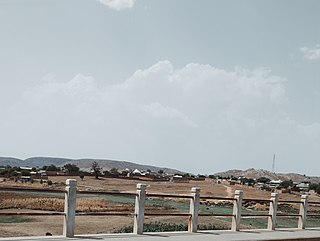
Animal sacrifice is the ritual killing and offering of one or more animals, usually as part of a religious ritual or to appease or maintain favour with a deity. Animal sacrifices were common throughout Europe and the Ancient Near East until the spread of Christianity in Late Antiquity, and continue in some cultures or religions today. Human sacrifice, where it existed, was always much rarer.

To a God Unknown is a novel by John Steinbeck, first published in 1933. The book was Steinbeck's second novel. Steinbeck found To a God Unknown extremely difficult to write; taking him roughly five years to complete, the novel proved more time-consuming than either East of Eden or The Grapes of Wrath, Steinbeck's longest novels.

Kano is a city in northern Nigeria and the capital of Kano State. It is the second largest city in Nigeria after Lagos, with over ten million citizens living within 449 km2 (173 sq mi). Located in the savanna, south of the Sahel, Kano is a major route of the trans-Saharan trade, having been a trade and human settlement for millennia. It is the traditional state of the Dabo dynasty who have ruled as emirs over the city-state since the 19th century. Kano Emirate Council is the current traditional institution inside the city boundaries of Kano, and under the authority of the Government of Kano State.

Triglav was the chief god of the Pomeranian and probably some of the Polabian Slavs, worshipped in Szczecin, Wolin and probably Brenna. His cult is attested to in several biographies of the bishop St. Otto of Bamberg in the years immediately preceding his suppression of it in 1127.

A wicker man was purportedly a large wicker statue in which the druids sacrificed humans and animals by burning. The main evidence for this practice is a sentence by Roman general Julius Caesar in his Commentary on the Gallic War, which modern scholarship has linked to an earlier Greek writer, Posidonius.

Blot-Sweyn was a Swedish king c. 1080, of disputed historicity, who was said to have replaced his Christian brother-in-law Inge as King of Sweden, when Inge had refused to administer the blóts at the Temple at Uppsala. There is no mention of Sweyn in the regnal list of the Westrogothic law, which suggests that his rule did not reach Västergötland. According to Swedish historian Adolf Schück he was probably the same person as Håkan the Red and was called the Blót Swain as an epithet rather than a personal name.
The Kano Chronicle is an Arabic-language manuscript that lists the rulers of Kano.

Baltic Finnic paganism, or BalticFinnic polytheism was the indigenous religion of the various of the Baltic Finnic peoples, specifically the Finns, Karelians, Estonians, Vepsians and Izhorians, prior to Christianisation. It was a polytheistic religion, worshipping a number of different deities. The chief deity was the god of thunder and the sky, Ukko; other important deities included Jumala, Ahti, and Tapio. Jumala was a sky god; today, the word "Jumala" refers to a monotheistic God. Ahti was a god of the sea, waters and fish. Tapio was the god of the forest and hunting.

The Inca religion was a group of beliefs and rites that were related to a mythological system evolving from pre-Inca times to Inca Empire. Faith in the Tawantinsuyu was manifested in every aspect of his life, work, festivities, ceremonies, etc. They were polytheists and there were local, regional and pan-regional divinities.

Ancient Celtic religion, commonly known as Celtic paganism, was the religion of the ancient Celtic peoples of Europe. Because there are no extant native records of their beliefs, evidence about their religion is gleaned from archaeology, Greco-Roman accounts, and literature from the early Christian period. Celtic paganism was one of a larger group of polytheistic Indo-European religions of Iron Age Europe.
Ali Dan Tsamiya known as Yaji I or Ali Yaji Dan Tsamiya was a king and later the first Sultan of Kano, a state in what is now Northern Nigeria. Yaji I ruled from 1349 to 1385 CE. A prominent figure in the state's history, Yaji used a religious revolution to finally solidify his family's grasp on Kano and its sub-kingdoms after centuries of strife. He was also responsible for the absorption of Rano into Kano.

Dalla Hill is a hill in Kano, Kano State, Nigeria. It is 534 metres (1,753 ft) high and contains a stairway with 101 steps to the bottom to top.
Gaya is a Local Government Area in Kano State, Nigeria. Its headquarters are in the town of Gaya in the north of the area.

Kazaure is an Emirate and a Local Government Area of Jigawa State, Nigeria. Its headquarters is in the ancient city of Kazaure.
The Kingdom of Kano was a Hausa kingdom in the north of what is now Nigeria that was established before 1000 AD, and lasted until the proclamation of the Sultanate of Kano by King Ali Yaji Dan Tsamiya in 1349. The capital is now the modern city of Kano in Kano State.

The Sultanate of Kano was a Hausa kingdom in the north of what is now Nigeria that dates back to 1349, when the king of Kano, Ali Yaji (1349–1385), dissolved the cult of Tsumbubra and proclaimed Kano a sultanate. Before 1000 AD, Kano had been ruled as an Animist Hausa Kingdom, the Kingdom of Kano. The sultanate lasted until the Fulani Jihad in 1805 and the assassination of the last sultan of Kano in 1807. The sultanate was then replaced by the Kano Emirate, subject to the Sokoto Caliphate. The capital is now the modern city of Kano in Kano State.
Abdullahi Dan Kanajeji, known as Abdullahi Burja, was the sixteenth ruler of Kano. Through forging of powerful alliances and the creation of trade routes, Burja shifted the identity of the Kano Sultanate towards trade and commerce, what Kano and its people are known for today. He was the first Hausa King to pay tribute to Bornu which secured an agreement to open trade routes from Gwanja to Bornu. He was also the first King to own camels in Hausaland. By the end of the 15th Century, Kano emerged as one of the most vibrant trading centers in the Sahel. Through trade, the Hausa language and culture was spread throughout the region.
Kanajeji Dan Yaji, known as Kanajeji, was the 13th ruler of Kano and, for a period, the ruler of Zazzau. He reigned from 1390 - 1410. Like his father, Yaji I, Kanajeji was an intrepid king whose reign was characterized by war, conquest, and religious reformation. Kanajeji engaged in two long and pivotal wars with Umbatu and Zazzau, and eventually prevailed in both, after lengthy feuds. He took Umbatu in four attempts, and Zazzau after two battles. He also renewed the suzerainty his father had imposed over the Kwararafa. However, in a bid to conquer Zazzau, his reign also saw the return of the pagan practices his father sought to expunge. He is credited with revolutionizing Kano's army through the introduction of quilted leather armors (lifidi), steel armors, coats of mail, and iron helmets.
The Bagauda Dynasty is a house of noblemen who founded and ruled the Kingdom of Kano throughout its existence. The Dynasty spanned over 800 years spread out through ten centuries, one of the longest in recorded human history and produced 43 rulers. After the fall of the dynasty in Kano, the remnants of the royal house founded a new kingdom in the Maradi Region.
Daud Dan Bawo, also known as Bagauda or Yakano, was the first King of Kano, in what is now northern Nigeria, reigning from 999 to 1063. He established a dynasty which would go on to rule the state for over 800 years. According to the Kano Chronicle, all subsequent kings and sultans of Kano descended from him.











